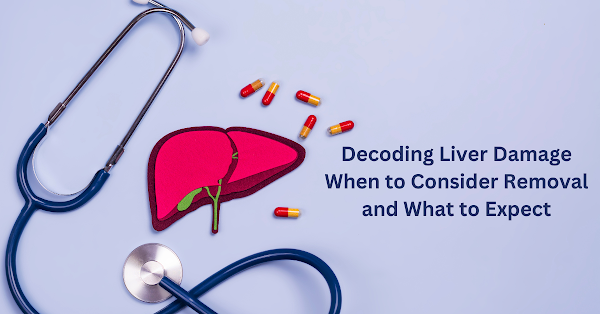Decoding Liver Damage: When to Consider Removal and What to Expect
Understanding Liver Damage
Liver damage, also known as liver disease or hepatic impairment, refers to a broad spectrum of conditions that can impair the liver's ability to function properly. The liver is remarkably resilient and can regenerate, but chronic damage or severe acute injury can overwhelm its capacity to heal.
Causes of Liver Damage
Several factors can induce liver disease, including:
Alcohol Abuse
Viral Infections
Non-Alcoholic Fatty Liver Disease (NAFLD)
Autoimmune Diseases
Toxins and Medications
Genetic Conditions
Signs of Liver Damage
Liver damage can remain asymptomatic in its early stages. However, as it progresses, it may manifest with a range of symptoms, including:
Fatigue and weakness
Jaundice (yellowing of the skin and eyes)
Abdominal pain or discomfort, especially in the upper right side
Unexplained weight loss
Swelling in the abdomen or legs
Dark urine and pale-colored stools
Nausea and vomiting
Loss of appetite
It's essential to note that symptoms can vary depending on the underlying cause and severity of liver damage. Regular check-ups and monitoring of liver function are crucial, especially if you have risk factors for liver disease.
When to Consider Liver Removal
Liver removal, also known as a liver transplant, is a significant surgical procedure and typically considered when the liver is severely damaged or when other treatment options have proven ineffective. Here are some situations when liver removal may be considered:
End-Stage Liver Disease: In cases of advanced liver disease, such as cirrhosis, where the liver is extensively scarred and can no longer function effectively, a liver transplant may be the only viable treatment option.
Liver Cancer: For individuals with liver cancer that cannot be surgically removed or treated with local therapies, a liver transplant may offer a chance at survival.
Fulminant Liver Failure: In rare instances, acute liver failure can occur rapidly due to various causes, and a transplant may be the only way to save the patient's life.
Hereditary Liver Diseases: Individuals with certain genetic liver disorders that cause severe liver damage may benefit from a liver transplant to replace the damaged organ with a healthy one.
Recurrent Liver Disease: In some cases, liver diseases such as hepatitis C may recur and lead to further liver damage after initial treatment. A transplant may be considered if the disease progresses.
The Liver Transplant Process
Liver transplantation is a complex procedure that involves the removal of the diseased liver and its replacement with a healthy donor liver. Here's an overview of the transplant process:
Evaluation: Before a liver transplant, a thorough evaluation is conducted to assess the patient's overall health, the severity of liver damage, and suitability for the procedure. This includes blood tests, imaging, and psychological assessments.
Donor Matching: A suitable donor liver is required for the transplant. Donor livers can come from deceased donors (cadaveric) or living donors (typically a family member or close friend). Donor-recipient compatibility is crucial.
Surgery: The transplant surgery is carried out under general anesthesia. The damaged liver is removed from the recipient (recipient hepatectomy), and the healthy donor liver is implanted. Blood vessels and bile ducts are carefully connected to ensure proper blood flow and bile drainage.
Recovery: After the surgery, the recipient is closely monitored in the intensive care unit (ICU) for a period, and then in a regular hospital room. Recovery times can vary, but most recipients stay in the hospital for a week to two weeks.
Post-Transplant Care: After discharge, patients require ongoing medical care and monitoring, including immunosuppressive medications to prevent rejection of the transplanted liver. Regular follow-up appointments are essential.
Lifestyle Changes: Patients are advised to make significant lifestyle changes post-transplant, including avoiding alcohol and adopting a healthy diet and exercise routine to maintain their new liver's health.
Benefits and Risks of Liver Transplants
Liver transplants can offer a second chance at life for individuals with severe liver disease. The benefits include:
Improved quality of life
Increased life expectancy
Resolution of symptoms and complications associated with liver disease
However, liver transplantation is not without risks. Some potential complications include:
Rejection of the transplanted liver
Infection
Complications related to immunosuppressive medications
Surgical complications
Recurrence of the underlying liver disease
It's important to note that advances in medical science and transplantation techniques have improved the success rates and safety of liver transplants over the years.
Timely diagnosis, management, and adherence to medical advice are crucial in preventing liver damage from reaching a point where transplantation becomes necessary. If you or a loved one are facing liver issues, it's essential to consult with the best liver doctor in coimbatore who can provide guidance and appropriate treatment options based on your unique circumstances. Liver transplantation, while a major procedure, has the potential to offer a new lease on life for those in need.




Comments
Post a Comment